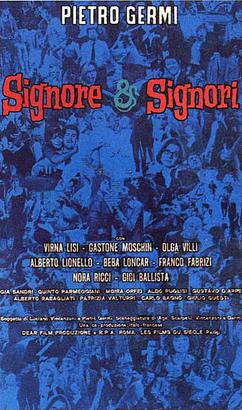Plot
In the fictional Venetian town of Rezega, a group of merchants and professionals from the upper-middle class conceal a complex web of underlying mutual betrayals.
Toni Gasparini, a charismatic playboy both admired and feared by friends, confides in Dr. Castellan, a friend and physician, admitting that he has been impotent for several months. This revelation is intended to make Castellan lower his guard regarding his young and lively wife, Noemi. Insensitively, the doctor spreads this confidential information among friends, purely for the pleasure of gossip, oblivious to the fact that he is inadvertently aiding Toni's scheme. Following a party, Castellan, along with others, continues the night of revelry at a nightclub, allowing Toni to accompany Noemi home. When a disbelieving friend, who had witnessed Gasparini's recent escapade about ten days prior, reveals this information, the doctor rushes home but arrives too late to prevent Noemi from being seduced. He is then compelled to conceal the incident to preserve his own honor. The historic phrase he utters while leaving the house is, "and let it stay between us," underscoring the importance of not being perceived as a "béco" or "cuckold" in Venetian dialect (and in the northeast in general).
Osvaldo Bisigato, an unassuming bank employee burdened by an oppressive and resentful wife, Gilda, who incessantly reproaches him for failures and a lack of ambition, believes he can embark on a new life by eloping with Milena Zulian, the young and beautiful cashier from the bar frequented by the group. However, while betrayal is tacitly tolerated, social norms reject separation, prompting the entire town to unite against him: Gilda's cousin (the influential Ippolita, Gasparini's wife), the so-called "friends," the employer, the parish priest, and even the carabinieri commander. They all coerce him to reconsider and maintain the illusion of the sanctity of marital union. Don Schiavon convinces Milena to leave town, and Bisigato, after a suicide attempt and a stint in a clinic, returns submissive and resigned.
Alda Cristofoletto, a young and beautiful country girl (characterized as white as milk and tough as marble by the shoe salesman Lino Benedetti), arrives in town for shopping and attracts the attention of a group of womanizers. However, the following day, Bepi Cristofoletto, the father of the sixteen-year-old girl, reports them all for corruption of a minor. To prevent the community from being tarnished by the trial's scandal, economic magnates and religious authorities silence the local press. Through a series of calls, they prompt the reporter Tosato to erase names until no culprits remain in the article. The cold and calculating Ippolita, the wife of one of the accused, convinces the naive and honest farmer Cristofoletto to withdraw the complaint. She offers him a substantial sum of money in return, satisfying her own carnal desires and securing a considerable portion of the funds collected for "mediation," ostensibly intended for the poor.
This page is based on this
Wikipedia article Text is available under the
CC BY-SA 4.0 license; additional terms may apply.
Images, videos and audio are available under their respective licenses.
